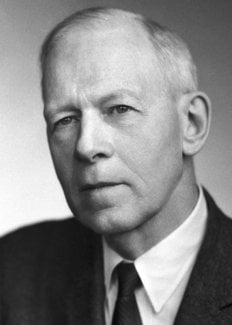Robert S. Mulliken
Biographical

Robert Sanderson Mulliken was born in Newburyport, Massachusetts, on June 7, 1896, the son of Samuel Parsons Mulliken, Professor of Organic Chemistry, and Katherine W. Mulliken. He married Mary Helen von Noè, December 24, 1929. Their children are Lucia Maria (Mrs. John P. Heard) and Valerie Noè.
Mulliken took a B.Sc. Degree in 1917 at the Massachusetts Institute of Technology, Cambridge, Mass., and a Ph.D. degree at the University of Chicago, Ill., in 1921.
Mulliken has been deeply interested in valence theory and molecular structure. His earlier work on isotopes and on diatomic band spectra was followed by theoretical systematization of the electronic states of molecules, mainly in terms of the idea of molecular orbitals. This included work on electronegativities, dipole moments, and valence-state energies. A subsequent series of papers on the theoretical interpretation of absolute intensities of electronic spectra led him to computations on conjugated organic molecules, and to the quantum-mechanical statement of the concept of hyperconjugation. There followed work on quantum-mechanical questions underlying molecular-orbital theory and on the use of interatomic overlap integrals as measures of bond energies. His more recent work has dealt extensively with the structure and spectra of molecular complexes, on the one hand, and on the other hand (extending and developing earlier work) with the structure and spectra of hydrogen, helium, nitrogen and other small molecules.
Mulliken was National Research Council Fellow, University of Chicago, and Harvard University, 1921-1925; Guggenheim Fellow, Germany and Europe, 1930 and 1932-1933; Fulbright Scholar, Oxford University, 1952-1954; Visiting Fellow, St. John’s College, Oxford, 1952-1953; Junior Chemical Engineer, Bureau of Mines, U.S. Department of Interior, Washington, D.C. 1917-1918; Assistant in Rubber Research, New Jersey Zinc Company, Pennsylvania, 1919.
His academic career includes the following positions: Assistant Professor of Physics, Washington Square College, New York University, 1926-1928; Associate Professor of Physics, University of Chicago, 1928-1931; Professor of Physics, University of Chicago, 1931-1961, and Chemistry, 1961; Ernest de Witt Burton Distinguished Service Professor, University of Chicago, 1956-1961; Distinguished Service Professor of Physics and Chemistry, University of Chicago, since 1961; Distinguished Research Professor of Chemical Physics, Florida State University (Jan.-March), since 1964. Other professional positions held: Director, Editorial Work and Information, Plutonium Project, University of Chicago, 1942-1945; Scientific Attaché, U.S. Embassy, London, 1955; Baker Lecturer, Cornell University, 1960; Silliman Lecturer, Yale University, Spring, 1965.
Mulliken received honorary degrees at Columbia University, 1939 (Sc.D.); the University of Stockholm, 1960 (Ph.D.); Marquette University, 1967 (Sc.D.); Cambridge University, 1967 (Sc.D.) ; and he holds several professional awards and honours of which a few are listed here: Bronze Medal Award, University of Liege, 1948; Peter Debye Award, California Section of the American Chemical Society, 1963; Willard Gibbs Medal, Chicago Section of the American Chemical Society, 1965; Gold Medal Award for Scientific Achievement, City College Chemistry Alumni Association, and 15th Bicentennial Lecturer, City College of New York, 1965.
He is a Member of the American Academy of Arts and Sciences, American Chemical Society, American Philosophical Society, National Academy of Sciences, Cosmos Club (Washington, D.C.), Quadrangle Club (Chicago, Ill.); a Fellow of the American Physical Society and the American Academy for the Advancement of Science; an Honorary Fellow of the Chemical Society of Great Britain (London) and the Indian National Academy of Science; a Foreign Member of the Royal Society of Great Britain; an Honorary Member of the Société de Chimie Physique; and a Corresponding Member of the Société Royale des Sciences de Liége.
His recreational interests include: driving a car, oriental rugs, and art.
This autobiography/biography was written at the time of the award and later published in the book series Les Prix Nobel/ Nobel Lectures/The Nobel Prizes. The information is sometimes updated with an addendum submitted by the Laureate.
Robert S. Mulliken died on October 31, 1986.
Nobel Prizes and laureates
Six prizes were awarded for achievements that have conferred the greatest benefit to humankind. The 12 laureates' work and discoveries range from proteins' structures and machine learning to fighting for a world free of nuclear weapons.
See them all presented here.
